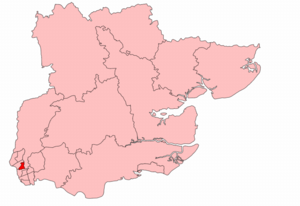Leyton East (UK Parliament constituency) facts for kids
Quick facts for kids {{{Name}}}[[{{{Type}}} constituency]] |
|
|---|---|
| [[Image:{{{Map1}}}Constituency.svg|120px|]] [[Image:England{{{Map2}}}.svg|120px|]] |
|
| {{{Name}}} shown within [[{{{Entity}}}]], and {{{Entity}}} shown within England | |
| Created: | {{{Year}}} |
| MP: | {{{MP}}} |
| Party: | {{{Party}}} |
| Type: | House of Commons |
| County: | [[{{{County}}}]] |
| EP constituency: | [[{{{EP}}} (European Parliament constituency)|{{{EP}}}]] |
Leyton East was a special area in the United Kingdom that used to choose a person to represent it in the country's government. This type of area is called a parliamentary constituency. It was located in the Municipal Borough of Leyton, which was part of Essex but is now in Greater London.
This area elected one person, known as a Member of Parliament (MP), to speak for its people. MPs work in the House of Commons, which is a main part of the Parliament of the United Kingdom. The MP was chosen using a system called "first past the post," meaning the candidate with the most votes won.
What Was Leyton East?
Leyton East was an important election area that existed for many years. It was created for the 1918 United Kingdom general election and stopped being an election area for the 1950 United Kingdom general election. After 1950, its areas became part of the Leyton constituency.
Where Was Leyton East Located?
The Leyton East constituency covered specific parts of the Urban District of Leyton. These areas included Cann Hall, Grove Green, Harrow Green, Leytonstone, and Wanstead Slip. These places are now part of modern-day London.
Who Represented Leyton East?
Many different Members of Parliament (MPs) represented Leyton East during its time. These MPs belonged to various political parties. The table below shows who served as the MP for Leyton East and which party they belonged to.
| Election | Member | Party | |
|---|---|---|---|
| 1918 | Cecil Malone | Liberal | |
| 1919 | British Socialist | ||
| 1920 | Communist | ||
| 1922 | Ernest Edward Alexander | Unionist | |
| 1923 | Archibald Church | Labour | |
| 1924 | Ernest Edward Alexander | Unionist | |
| 1929 | Fenner Brockway | Labour | |
| 1931 | Sir Frederick Mills | Conservative | |
| 1945 | Albert Bechervaise | Labour | |
| 1950 | constituency abolished: see Leyton | ||
 | Audre Lorde |
 | John Berry Meachum |
 | Ferdinand Lee Barnett |


